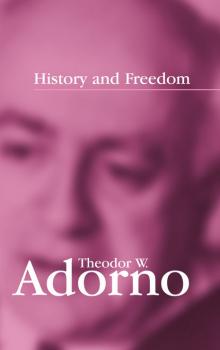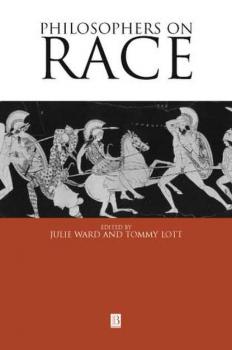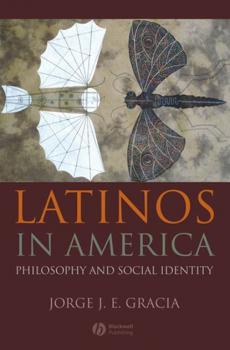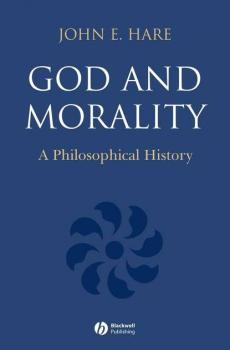ТОП просматриваемых книг сайта:
Философия
Различные книги в жанре Философия, доступные для чтения и скачиванияАннотация
Despite all of humanity's failures, futile efforts and wrong turnings in the past, Adorno did not let himself be persuaded that we are doomed to suffer a bleak future for ever. One of the factors that prevented him from identifying a definitive plan for the future course of history was his feelings of solidarity with the victims and losers. As for the future, the course of events was to remain open-ended; instead of finality, he remained committed to a Hölderlin-like openness. This trace of the messianic has what he called the colour of the concrete as opposed to mere abstract possibility. Early in the 1960s Adorno gave four courses of lectures on the road leading to Negative Dialectics, his magnum opus of 1966. The second of these was concerned with the topics of history and freedom. In terms of content, these lectures represented an early version of the chapters in Negative Dialectics devoted to Kant and Hegel. In formal terms, these were improvised lectures that permit us to glimpse a philosophical work in progress. The text published here gives us an overview of all the themes and motifs of Adorno's philosophy of history: the key notion of the domination of nature, his criticism of the existentialist concept of a historicity without history and, finally, his opposition to the traditional idea of truth as something permanent, unchanging and ahistorical.
Аннотация
In this important new book, Jürgen Habermas takes up certain fundamental questions of philosophy. While much of his recent work has been concerned with issues of morality and law, in this new work Habermas returns to the traditional philosophical questions of truth, objectivity and reality which were at the centre of his earlier classic book Knowledge and Human Interests. How can the norms that underpin the linguistically structured world in which we live be brought into step with the contingency of the development of socio-cultural forms of life? How can the idea that our world exists independently of our attempts to describe it be reconciled with the insight that we can never reach reality without the mediation of language and that 'bare' reality is therefore unattainable? In Knowledge and Human Interests Habermas answered these questions with reference to a weak naturalism and a transcendental-pragmatic realism. Since then, however, he has developed a formal pragmatic theory which is based on an analysis of speech acts and language use. In this new volume Habermas takes up the philosophical questions of truth, objectivity and reality from the perspective of his linguistically-based pragmatic theory. The final section addresses the limits of philosophy and reassesses the relation between theory and practice from a perspective that could be described as 'post-Marxist'. This volume, now available in paperback as well, by one of the world's leading philosophers will be essential reading for students and scholars of philosophy, social theory and the humanities and social sciences generally.
Аннотация
This book offers a systematic attempt to explore the point of convergance between feminist theory and the work of Michel Foucault.
Аннотация
This book is a brilliant and timely analysis of the complex issues raised by the relation between women and philosophy. It offers a critical account of a wide range of contemporary philosophical and feminist texts and it develops this account into an original project of critical feminist thought. Braidotti examines contemporary French philosophy as practised by men such as Foucault and Derrida, showing that they rely on a notion of 'the feminine' in order to undermine classical thought, which bears no direct relevance to the historical experience of women. Braidotti then looks at the attempts of contemporary feminist thinkers in Europe and the United States to show the gendered nature of discursive power games. She discusses the contributions of Luce Irigaray and many other feminist theorists to the understanding of sexual difference and of its implications for philosophy and politics. This book will be of interest to students and researchers in women's studies, feminist theory, social theory, cultural studies, philosophy and literature, and anyone interested in contemporary feminism and the relation between feminist theory, post-structuralism and psychoanalysis.
Аннотация
In this new book, Slavoj Žižek and Glyn Daly engage in a series of entertaining conversations which illustrate the originality of Žižek’s thinking on psychoanalysis, philosophy, multiculturalism, popular/cyber culture, totalitarianism, ethics and politics. An excellent introduction to one of the most engaging and controversial cultural theorists writing today. Žižek is a Slovenian sociologist who trained as a Lacanian and uses Lacan to analyse popular culture and politics. Illustrates the originality of Žižek’s thinking on psychoanalysis, philosophy, multi-culturalism, popular/cyber culture, totalitarianism, ethics and politics. Provides a unique glimpse of Žižek’s humour and character and offers new material and fresh perspectives which will be of interest to followers of Žižek’s writings.
Аннотация
Philosophers on Race adds a new dimension to current research on race theory by examining the historical roots of the concept in the works of major Western philosophers.
Аннотация
A first-of-its-kind book that seriously and profoundly examines what it means philosophically to be Latino and where Latinos fit in American society. Offers a fresh perspective and clearer understanding of Latin American thought and culture, rejecting answers based on stereotypes and fear Takes an interdisciplinary approach to the philosophical, social, and political elements of Hispanic/Latino identity, touching upon anthropology, history, cultural studies and sociology, as well as philosophy Written by Jorge J. E. Gracia, one of the most influential thinkers of Hispanic/Latino descent
Аннотация
Citing recent examples including Enron, Arthur Andersen, and WorldCom, Permission to Steal explores what went wrong and advocates a universal reassessment of what is considered “good” in corporate America. A fascinating exploration of the recent corporate scandals which have rocked the global business community. Written with sharp and compelling style, suitable for students, professionals, and general readers. Companion website offers discussion points for the book as well as an up-to-date chronology of ongoing corporate scandals.
Аннотация
God and Morality evaluates the ethical theories of four principle philosophers, Aristotle, Duns Scotus, Kant, and R.M. Hare. Uses their thinking as the basis for telling the story of the history and development of ethical thought more broadly Focuses specifically on their writings on virtue, will, duty, and consequence Concentrates on the theistic beliefs to highlight continuity of philosophical thought
Аннотация
This book is an original discussion of key problems in moral theory. The author argues that the work of recent feminist theorists in this area, particularly that of Carol Gilligan, marks a radically new departure in moral thinking. Gilligan claims that there is not only one true, moral voice, but two: one masculine, one feminine. Moral values and concerns associated with a feminine outlook are relational rather than autonomous; they depend upon interaction with others. In a far-reaching examination and critique of Gilligan's theory, Hekman seeks to deconstruct the major traditions of moral theory which have been dominant since the Enlightenment. She challenges the centrepiece of that tradition: the disembodied, autonomous subject of modernist philosophy. Gilligan's approach transforms moral theory from the study of abstract universal principles to the analysis of moral claims situated in the interactions of people in definite social contexts. Hekman argues that Gilligan's approach entails a multiplicity of moral voices, not just one or even two. This book addresses moral problems in a challenging way and will find a wide readership among philosopher's, feminist thinkers and psychologists.










